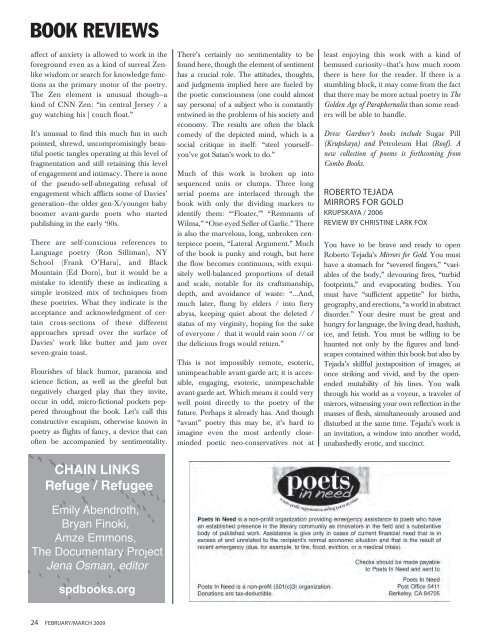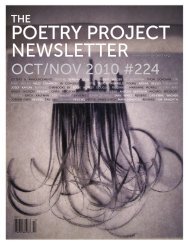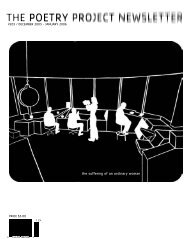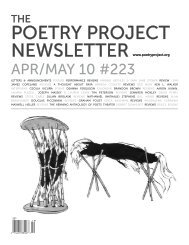Download PDF - The Poetry Project
Download PDF - The Poetry Project
Download PDF - The Poetry Project
Create successful ePaper yourself
Turn your PDF publications into a flip-book with our unique Google optimized e-Paper software.
BOOK REVIEWSaffect of anxiety is allowed to work in theforeground even as a kind of surreal Zenlikewisdom or search for knowledge functionsas the primary motor of the poetry.<strong>The</strong> Zen element is unusual though—akind of CNN Zen: “in central Jersey / aguy watching his | couch float.”It’s unusual to find this much fun in suchpointed, shrewd, uncompromisingly beautifulpoetic tangles operating at this level offragmentation and still retaining this levelof engagement and intimacy. <strong>The</strong>re is noneof the pseudo-self-abnegating refusal ofengagement which afflicts some of Davies’generation—the older gen-X/younger babyboomer avant-garde poets who startedpublishing in the early ‘90s.<strong>The</strong>re are self-conscious references toLanguage poetry (Ron Silliman), NYSchool (Frank O’Hara), and BlackMountain (Ed Dorn), but it would be amistake to identify these as indicating asimple ironized mix of techniques fromthese poetries. What they indicate is theacceptance and acknowledgment of certaincross-sections of these differentapproaches spread over the surface ofDavies’ work like butter and jam overseven-grain toast.Flourishes of black humor, paranoia andscience fiction, as well as the gleeful butnegatively charged play that they invite,occur in odd, micro-fictional pockets pepperedthroughout the book. Let’s call thisconstructive escapism, otherwise known inpoetry as flights of fancy, a device that canoften be accompanied by sentimentality.<strong>The</strong>re’s certainly no sentimentality to befound here, though the element of sentimenthas a crucial role. <strong>The</strong> attitudes, thoughts,and judgments implied here are fueled bythe poetic consciousness (one could almostsay persona) of a subject who is constantlyentwined in the problems of his society andeconomy. <strong>The</strong> results are often the blackcomedy of the depicted mind, which is asocial critique in itself: “steel yourself—you’ve got Satan’s work to do.”Much of this work is broken up intosequenced units or clumps. Three longserial poems are interlaced through thebook with only the dividing markers toidentify them: “‘Floater,’” “Remnants ofWilma,” “One-eyed Seller of Garlic.” <strong>The</strong>reis also the marvelous, long, unbroken centerpiecepoem, “Lateral Argument.” Muchof the book is punky and rough, but herethe flow becomes continuous, with exquisitelywell-balanced proportions of detailand scale, notable for its craftsmanship,depth, and avoidance of waste: “...And,much later, flung by elders / into fieryabyss, keeping quiet about the deleted /status of my virginity, hoping for the sakeof everyone / that it would rain soon // orthe delicious frogs would return.”This is not impossibly remote, esoteric,unimpeachable avant-garde art; it is accessible,engaging, esoteric, unimpeachableavant-garde art. Which means it could verywell point directly to the poetry of thefuture. Perhaps it already has. And though“avant” poetry this may be, it’s hard toimagine even the most ardently closemindedpoetic neo-conservatives not atleast enjoying this work with a kind ofbemused curiosity—that’s how much roomthere is here for the reader. If there is astumbling block, it may come from the factthat there may be more actual poetry in <strong>The</strong>Golden Age of Paraphernalia than some readerswill be able to handle.Drew Gardner’s books include Sugar Pill(Krupskaya) and Petroleum Hat (Roof). Anew collection of poems is forthcoming fromCombo Books.ROBERTO TEJADAMIRRORS FOR GOLDKRUPSKAYA / 2006Review by CHRISTINE LARK FOXYou have to be brave and ready to openRoberto Tejada’s Mirrors for Gold. You musthave a stomach for “severed fingers,” “variablesof the body,” devouring fires, “turbidfootprints,” and evaporating bodies. Youmust have “sufficient appetite” for births,geography, and erections, “a world in abstractdisorder.” Your desire must be great andhungry for language, the living dead, hashish,ice, and fetish. You must be willing to behaunted not only by the figures and landscapescontained within this book but also byTejada’s skillful juxtaposition of images, atonce striking and vivid, and by the openendedmutability of his lines. You walkthrough his world as a voyeur, a traveler ofmirrors, witnessing your own reflection in themasses of flesh, simultaneously aroused anddisturbed at the same time. Tejada’s work isan invitation, a window into another world,unabashedly erotic, and succinct.CHAIN LINKSRefuge / RefugeeEmily Abendroth,Bryan Finoki,Amze Emmons,<strong>The</strong> Documentary <strong>Project</strong>Jena Osman, editorspdbooks.org24 february/march 2009
















